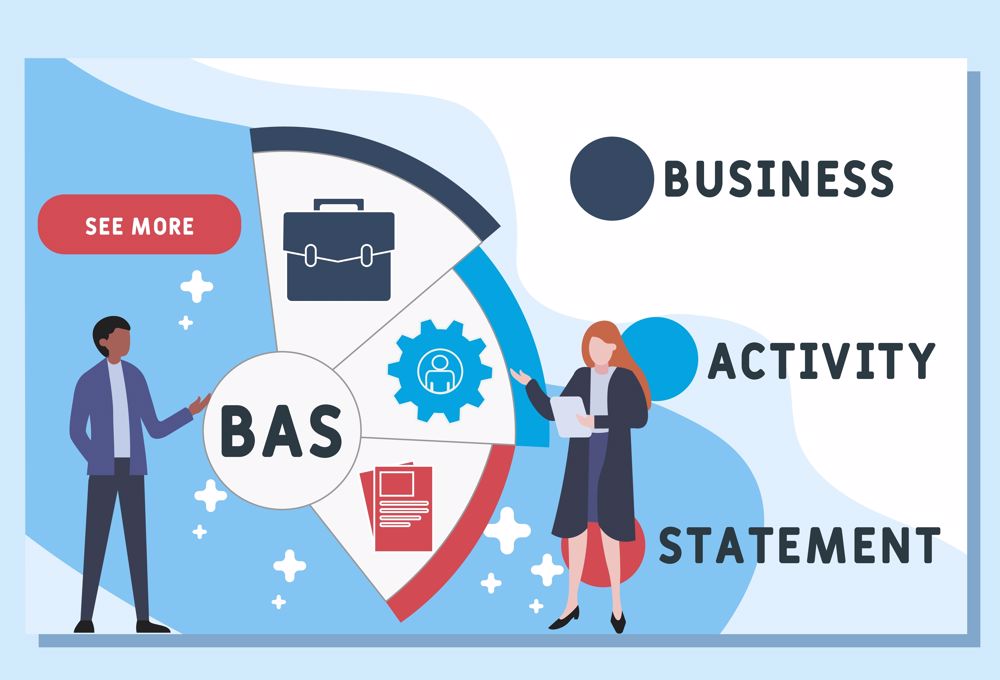
What is BAS in accounting?
Running a small business in Australia often means dealing with the headache that is tax, and one of the key components you’ll encounter is the Business Activity Statement (BAS). This article will walk you through everything you need to know about BAS reporting, including what BAS is, how it works and how to lodge it.
Understanding and managing your BAS effectively allows you to smooth out your cash flows and stay on top of your tax requirements. Whether you’re looking to streamline your BAS preparation or simply want to ensure you’re compliant with the Australian Taxation Office (ATO) guidelines, this guide has you covered.
For more support on tax-related matters, help with tax planning and accounting services, check out our Small Business Tax Services.
What is a BAS in accounting?
A BAS is a crucial form that businesses registered for GST (Goods and Services Tax) must file regularly with the ATO. BAS stands for Business Activity Statement, which in accounting is used to summarise all the taxes a business has paid or is expected to pay during a specific period.
The BAS form is designed to help businesses report and meet their tax obligations for items such as GST and Pay As You Go (PAYG) withholding. By lodging BAS, businesses can manage their cash flow more effectively and avoid unexpected tax bills at the end of the financial year. Typically, businesses can choose to lodge their BAS either monthly or quarterly, depending on their turnover and specific tax requirements.
For a more detailed explanation, you can watch this YouTube video that covers the essentials of BAS.
 Business Activity Statement acronym
Business Activity Statement acronymHow does BAS work?
When you lodge a BAS, you’re essentially providing the ATO with a broad account of your business’s financial activities related to taxes. The primary focus is on reporting your taxable sales and purchases, which directly impact your GST obligations. This is how it works:
On the BAS form, you report the total value of your taxable sales — these are the goods and services sold that attract GST. You also report your taxable purchases, which are the goods and services you’ve bought that include GST. This data is critical for determining your net GST liability.
Beyond GST, the BAS form is used to report other essential tax obligations, like PAYG withholding for your employees’ wages and fringe benefits tax. This ensures that all relevant tax amounts are accounted for in one consolidated report.
This calculation considers the GST you’ve collected, the credits you’re claiming, and any other tax obligations due. If the GST on your purchases exceeds what you’ve collected from sales, you may be entitled to a refund.
Who needs to lodge a BAS?
All GST-registered businesses, regardless of size, must lodge a BAS regularly. This requirement applies whether you report monthly or quarterly, ensuring that your tax obligations are met on time.
How to lodge a BAS
Lodging your BAS is straightforward, but it’s crucial to ensure it’s done correctly and on time to avoid any penalties. Here’s how you can use to lodge your BAS:
- Online lodgment: The most efficient way to lodge your BAS is online. You can do this through the ATO’s Business Portal or via accounting software that integrates with the ATO’s systems, such as myob. With this method, you can also track its status.
- Using a tax or BAS agent: If managing your BAS feels overwhelming, you can engage a registered tax agent or BAS agent. They can lodge your BAS on your behalf and ensure all details are accurate and compliant with ATO requirements.
- Lodging by mail: For those who prefer traditional methods, you can lodge your BAS by mail. However, this method is less efficient and comes with earlier due dates, which could impact your cash flow.
Missing a due date can result in penalties, interest charges and additional stress. If you’re struggling to meet a deadline, it’s advisable to contact the ATO or your BAS accountant to explore options like setting up a payment plan.
BAS due dates
Your BAS lodgment schedule depends on your business’s GST turnover:
- Monthly lodgment: Businesses with a GST turnover of $20 million or more must lodge their BAS monthly. The due date is the 21st day of the following month.
- Quarterly lodgment: For businesses with a turnover below $20 million, BAS is typically lodged quarterly. The due dates are:
- Q1 (July-September): 28 October
- Q2 (October-December): 28 February
- Q3 (January-March): 28 April
- Q4 (April-June): 28 July
If a due date falls on a public holiday or weekend, you have until the next business day to lodge your BAS.
Calculating BAS
To calculate your BAS by following these steps:
Step 1
Begin by identifying your taxable sales — these are the goods and services sold that include GST. Then, calculate your taxable purchases, which are business expenses that also include GST.
Step 2
Calculate net GST:
- GST owed: This is the total GST collected from your sales.
- GST credits: This is the GST paid on your purchases.
- Net GST: Subtract the GST credits from the GST owed. The result is your net GST amount, which will indicate whether you owe money to the ATO or are due a refund.
Step 3
The BAS is calculated by summing all relevant tax data for the reporting period. This includes GST owed, PAYG withholding amounts and any other tax liabilities. Your net GST, combined with these additional obligations, forms the total amount reported on your BAS.
What’s the difference between GST and BAS?
GST is a tax applied to sales and purchases, while BAS is the form used to report these GST transactions and other taxes to the ATO. In essence, BAS is the tool for reporting your GST obligations.
Choosing a method to complete your BAS
Completing your BAS statement efficiently requires choosing the right method. Accounting software offers a streamlined approach by automating the tracking of sales, purchases and GST, which minimises errors and saves time. Tools like myob allow for real-time updates, making the BAS lodgment process straightforward and less prone to mistakes.
For businesses with more complex financials, a professional tax agent is often the best choice. A tax agent ensures your BAS is accurate, compliant with ATO regulations and submitted on time, helping you avoid potential penalties. Regardless of the method you choose, regular financial tracking and diligent bookkeeping are crucial. Keeping your records up to date simplifies BAS preparation and gives you a clear picture of your business’s financial health.
Tips for staying on top of your bas
Regularly checking on your company’s BAS can help you stay on top of its tax requirements. Considering Xero reports that 44 per cent of small businesses in Australia are not cash flow positive, unexpected tax payments can be the final critical blow.
Understanding the tax health of your business means you can make better-informed decisions and focus on business development rather than scrambling to make filing dates and avoiding penalties.
So, what are some of the ways you can stay on top of BAS?
Accounting software
Investing in accounting software can save you valuable time and energy. It also helps a business keep accurate records for filing taxes, and some systems even allow you to file returns through the program itself.
Once a week, spend some time going through your finances. Decent accounting software will be able to integrate with your business accounts, capturing everything from debit card transactions to online payments. With this data already there, all you need to do is make sure cash payments are added, GST is recorded accurately, and everything is associated with the right categories for BAS.
Doing this regularly will keep you thinking about cash flow, and the financial side of the business, while making the process simple. If you’re only organising your records when BAS is due, the work will pile up, and remembering what transactions were for will be difficult.
Use professional tax agents
Using a tax agent will ensure you never miss a deadline for BAS, or face late-filing penalties. Some will also be able to handle your BAS, freeing up even more time.
By keeping on top of the company’s BAS for you, they can also give feedback on how business is going and offer advice on how to prepare your GST accounts for review. Look for Chartered Accountants who are also business development consultants if you want to get even more information on how to grow and manage your company and get assistance with financial planning.
Don’t let BAS be one more tax hassle. Talk to Wilson Porter and work with an accountant to regularly check in on your business activity statement to get the most out of it.


 When and why your small business needs an accountant
When and why your small business needs an accountant The surprising creative side of accountants
The surprising creative side of accountants Conditions looking up for Aussie small businesses
Conditions looking up for Aussie small businesses